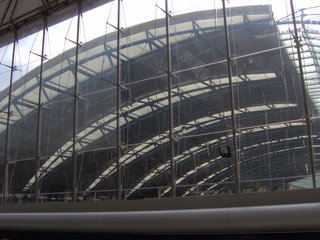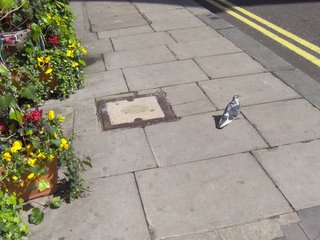Wednesday, January 25, 2006
No Woman's Land

I’m looking at the comments left here yesterday, when I said I never saw the same people twice on my walk to work. “I'm amazed you don't begin to recognise anyone.” “This will change: didn't you have ‘nodding acquaintances’ with people on buses and the tube who rode the same route at the same time every day?”. Well, no. Really. I examine my perceptions, all too aware of my negative prejudices and the ease with which I edit out what doesn’t conform to them. But no, really.
This is London. Four years of exactly this daily bus-journey to work and back. Every day the same bus-stop at precisely the same time. I can count on the fingers of one hand the people seen more than once. And god knows I’d notice – not much else to do at a bus-stop. There’s an elderly woman who gets my bus perhaps once a month. A mother and her chubby son who started secondary school back in September. They chat nervously. He doesn’t like the new school, clearly. She goes with him to make sure he gets there. I’ve seen them 5 or 6 times over the months. Another mother and her teenage daughter: half a dozen times over as many years, the girl transmuting from spindly schoolgirl to fashion-model elegance, while the mother disappears in spreading clumps of flesh and anorak.
That’s all. For this is the megalopolis. Even it’s small corners have no edges. We drift like particles and never coalesce. Only the most structured intersections bring people together for long enough to call it a meeting.
And now, walking to work, I get to know the timing of the traffic lights, the reflections in certain windows, the handful of leaves left on a tree, the crooked manhole cover that threatens to trip me. But not the people. Many of them walk the pavements between 8 and 9 am, though fewer in the evening. People live as well as work in this central district I walk through, just South of the Thames. Estates of social housing. Student residences. South-Asian, Cypriot and Italian shop- and cafe-keepers. I notice them, watch them. Many races. Many costumes. The way they bump together in pairs and groups. But I never see the same ones twice. It’s all too big. They are too many. We do not intersect. It’s not hostility. Not even deliberate indifference. We’re just not very present – or present perhaps to a conceptual entity called London, but not to a physical spot within it.

I’m looking at the comments left here yesterday, when I said I never saw the same people twice on my walk to work. “I'm amazed you don't begin to recognise anyone.” “This will change: didn't you have ‘nodding acquaintances’ with people on buses and the tube who rode the same route at the same time every day?”. Well, no. Really. I examine my perceptions, all too aware of my negative prejudices and the ease with which I edit out what doesn’t conform to them. But no, really.
This is London. Four years of exactly this daily bus-journey to work and back. Every day the same bus-stop at precisely the same time. I can count on the fingers of one hand the people seen more than once. And god knows I’d notice – not much else to do at a bus-stop. There’s an elderly woman who gets my bus perhaps once a month. A mother and her chubby son who started secondary school back in September. They chat nervously. He doesn’t like the new school, clearly. She goes with him to make sure he gets there. I’ve seen them 5 or 6 times over the months. Another mother and her teenage daughter: half a dozen times over as many years, the girl transmuting from spindly schoolgirl to fashion-model elegance, while the mother disappears in spreading clumps of flesh and anorak.
That’s all. For this is the megalopolis. Even it’s small corners have no edges. We drift like particles and never coalesce. Only the most structured intersections bring people together for long enough to call it a meeting.
And now, walking to work, I get to know the timing of the traffic lights, the reflections in certain windows, the handful of leaves left on a tree, the crooked manhole cover that threatens to trip me. But not the people. Many of them walk the pavements between 8 and 9 am, though fewer in the evening. People live as well as work in this central district I walk through, just South of the Thames. Estates of social housing. Student residences. South-Asian, Cypriot and Italian shop- and cafe-keepers. I notice them, watch them. Many races. Many costumes. The way they bump together in pairs and groups. But I never see the same ones twice. It’s all too big. They are too many. We do not intersect. It’s not hostility. Not even deliberate indifference. We’re just not very present – or present perhaps to a conceptual entity called London, but not to a physical spot within it.
And there's freedom, of course, in this floating existence. That's what brings and keeps people here - the ones who have a choice. It's been pretty joyless at times, but I've grown here, while I might have withered somewhere more constricting. 
Comments:
<< Home
Looking back on when I lived in Boston, the only people you'd see repeatedly would be the homeless folks, who had regular "stations" where they'd camp out.
Everyone else was too busy & "on the move* to be recognized repeatedly. It would have been like tracking an individual electron: too fast, too energetic.
Everyone else was too busy & "on the move* to be recognized repeatedly. It would have been like tracking an individual electron: too fast, too energetic.
Jean, in saying I was amazed, I didn't mean to imply I doubted the truth of what you said. Your description took me back to my daily route to and from school in Paris - swirls of people on the street, in the metro - they were too many and too fast to ever pass by more than once. Only the shopkeepers kept approximately still. But that amazes me! Perhaps it's my perennial desire for connection that makes me feel that it seems like it shouldn't be possible... but it certainly is.
I certainly agree with TC that your posts are a pleasure to read.
I certainly agree with TC that your posts are a pleasure to read.
I think I understood for the first time, when I read your last post, what it would really be like to live in London, and why you want to get out. It really is on an inhuman scale.
& what Mr Cole said.
& what Mr Cole said.
It's funny. I've been using public transport more this winter in Montreal, and although I don't recognize people yet, I certainly do recognize the ones who walk to and from work past our apartment each day. Maybe our city, while still large, is just small enough and set up on a neighborhood scale that allows for greater recognition. I'm going to pay closer attention to this as I become more a part of it all.
I loved this writing. What most? The poetry at the centre, in that 3rd paragraph, that teju cole already quoted back to you. And how you express not just the strangeness of cities but how it's normal in an ocean of people. And then I thought about how inner city neighbourhoods become warm and intimate and almost small town-like over time as you get to know people, in the park with your dog, in the stores, neighbours and friends. So you walk, always seeing multitudes of strangers, and a few familiar faces. I've always thought the core of a large city was like a jungle.
I like feeling private in the midst of people. I feel a bit violated when I see someone I know in a crowd, like being caught out. I can feel I have the whole city to myself, a cast of thousands. Partly, because I have occasionally had to reach out for help, and gotten it readily. Because I have given help when needed, as the wall of anonymity is actually only an illusion.
I have felt the oppression of small town intrusiveness and small place politics. The wrong sense of community is for me far worse than the artificial isolation.
I have felt the oppression of small town intrusiveness and small place politics. The wrong sense of community is for me far worse than the artificial isolation.
The best days of city life for me was when there was an emergency of some sorts. Like when inordinate amounts of rain flooded the subways and the city had to walk to work. Otherwise, it's so monotonous.
Post a Comment
<< Home



